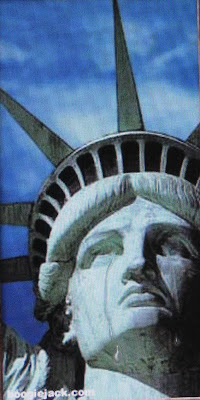Rock on which Freedom
Stumps its toe--
The great mistake
That Jamestown made long ago."
---Langston Hughes, "American Heartbreak"
This morning's newspaper declared in a headline: "SENATE OKS IMMIGRATION BILL". The clinker is that now the Bill goes to the House of Representatives . The Republican leadership has already indicated that the bill will not get a vote in that chamber. The President has called the Senate's effort a historic step on one of the most important planks in his second-term agenda. Vice President Biden has called the vote a milestone. Senator Marco Rubio has said he thinks it is critical to fix this broken system.
Well and good--because it gives 11 million immigrants some status so they don't fear being deported unless they commit a crime. But I have been wondering what kind of progress is this bill, really. It may never make it into law--the House of Representatives controlled by the Republicans may make sure this never happens. Unless--that is, their leaders realize which way the wind is blowing and vote for the bill hoping to get some traction at the voting booth. Would you vote for somebody who obviously did not care for your well-being but desperately cared for your vote? Hmm.
One of my favorite plays is Inherit the Wind. One of the characters in that play says: "Bert, whenever you see something bright, shining, perfect-seeming--all gold, with purple spots--look behind the paint! And if it's a lie--show it up for what it really is!! We've got to look behind the paint on this issue. What do we find?
- This bill allows the nation's unauthorized immigrants temporary legal status after they've passed a criminal background check, paid a fine (for what?) and paid whatever back taxes they may owe.
- If they maintain a clean record and hold a job (if they can get one) they can then apply for a green card in ten years and U.S. citizenship three years later.
Senator Lindsay Graham, supporter of this bill says: "Then they can get at the back of the line and apply for citizenship in our country." As I read these words I remember another not back of the line but back of the bus that is a not-so-proud part of our history.
This bill means that if you keep your nose clean and jump through all our hoops you may just be able to apply for citizenship in thirteen years.
On this July 4th week-end I keep remembering our American poet wrote:
"Give me your tired, your poor,
Your huddled masses yearning to breathe free,
The wretched refuse of your teeming shore
Send these, the homeless, tempest-tossed to me,
I lift my lamp beside the golden door."
+ + +
"Unless we are all free, we are none free."
+ + +
"We who are prosperous and independent have not
sufficient homogeneity to champion on the ground
of a common creed, common stock, a common history,
a common heritage of misfortune,
the rights of the lowest and poorest Jew-peddler
who flees, for life and liberty of thought, from Slavic mobs."
"Give me your tired, your poor,
Your huddled masses yearning to breathe free,
The wretched refuse of your teeming shore
Send these, the homeless, tempest-tossed to me,
I lift my lamp beside the golden door."
+ + +
"Unless we are all free, we are none free."
+ + +
"We who are prosperous and independent have not
sufficient homogeneity to champion on the ground
of a common creed, common stock, a common history,
a common heritage of misfortune,
the rights of the lowest and poorest Jew-peddler
who flees, for life and liberty of thought, from Slavic mobs."


.jpg)




.jpg)
.JPG)



